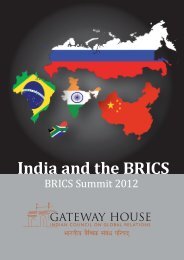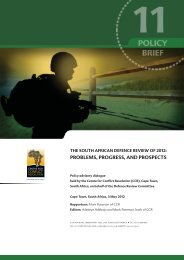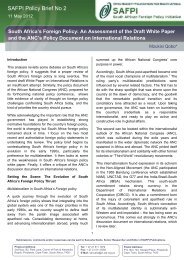A N A L Y S I SThere is growing demand for <str<strong>on</strong>g>Africa</str<strong>on</strong>g>’s natural resources from India and China. Photo: http://africaoil.ning.comadvantage in the medium to l<strong>on</strong>g term: its str<strong>on</strong>g diasporiccommunity <strong>on</strong> the ground in <str<strong>on</strong>g>Africa</str<strong>on</strong>g>, its proximity to thec<strong>on</strong>tinent, its use of historical ties and <str<strong>on</strong>g>special</str<strong>on</strong>g> niche areas topromote its cause of <str<strong>on</strong>g>Africa</str<strong>on</strong>g>n friendship, its first-classeducati<strong>on</strong>al system and its enduring democratic traditi<strong>on</strong> willc<strong>on</strong>tribute towards making it more competitive than China(Cheru and Obi 2011).Brazil and africaOf the three major <strong>emerging</strong> <strong>powers</strong> discussed here, Brazilis the least engaged in <str<strong>on</strong>g>Africa</str<strong>on</strong>g>. China’s role in <str<strong>on</strong>g>Africa</str<strong>on</strong>g> is nowwidely scrutinised. India’s presence in <str<strong>on</strong>g>Africa</str<strong>on</strong>g> is still a fringetopic, but an <strong>emerging</strong> group of analysts has begun to studyIndia’s presence systematically. Brazil <strong>on</strong> the other hand isnew, though its activities in <str<strong>on</strong>g>Africa</str<strong>on</strong>g> are arousing growing interestaround the world. C<strong>on</strong>sidering that Brazil does not needto import energy nor food, what are Brazil’s interests in <str<strong>on</strong>g>Africa</str<strong>on</strong>g>?Brazil’s historical origins owes much to <str<strong>on</strong>g>Africa</str<strong>on</strong>g>, in part dueto the role of the Atlantic slave trade and its role in the widercommercial network of the Portuguese empire. Until fairlyrecently, Brazilian foreign and ec<strong>on</strong>omic policy’s historicalfocus <strong>on</strong> North America, Europe and South America hadrelegated ties with <str<strong>on</strong>g>Africa</str<strong>on</strong>g> to the margins. The mainc<strong>on</strong>sequence of this lack of active engagement in <str<strong>on</strong>g>Africa</str<strong>on</strong>g> is thatBrazil has lagged behind China and India in formulating andimplementing a comprehensive <str<strong>on</strong>g>Africa</str<strong>on</strong>g> policy. Thus, althoughit is in the process of expanding its commercial and financialties, Brazil’s trade with <str<strong>on</strong>g>Africa</str<strong>on</strong>g> remains relatively low andfocused <strong>on</strong> <strong>on</strong>ly a few countries, while at the same time Brasiliahas actively sought to elevate and integrate <str<strong>on</strong>g>Africa</str<strong>on</strong>g> into itsglobal foreign policy.The evoluti<strong>on</strong> of Brazilian foreign policy over the last sixtyyears has produced differing policy approaches to <str<strong>on</strong>g>Africa</str<strong>on</strong>g>.However, there has been a c<strong>on</strong>tinuum in Brazilian foreignpolicy towards <str<strong>on</strong>g>Africa</str<strong>on</strong>g> in terms of a commitment to respectingsovereignty and n<strong>on</strong>-interference in domestic affairs.Underlying Brazil’s <str<strong>on</strong>g>Africa</str<strong>on</strong>g> policy is a desire to prioritiseBrazilian developmental and commercial aims in approachingthe c<strong>on</strong>tinent while at the same time resp<strong>on</strong>ding tobroader foreign policy ambiti<strong>on</strong>s. In the period between 1945and 1974, this manifested itself as a policy of general (thoughnot uniform) diplomatic support for French and Portuguesepositi<strong>on</strong>s in <str<strong>on</strong>g>Africa</str<strong>on</strong>g> in fora such as the United Nati<strong>on</strong>s. Thisapproach was guided in part by mercantilist needs of securingEuropean investment in the Brazilian ec<strong>on</strong>omy as well asaccessing its markets, and culminated in particularly close tieswith Portuguese territories as well as str<strong>on</strong>g trade ties withSouth <str<strong>on</strong>g>Africa</str<strong>on</strong>g> that practised apartheid.With the collapse of the Portuguese empire in <str<strong>on</strong>g>Africa</str<strong>on</strong>g>in the mid-1970s, Brazil reached out to the rest of <str<strong>on</strong>g>Africa</str<strong>on</strong>g>diplomatically but essentially remained c<strong>on</strong>fined in ec<strong>on</strong>omicterms to Lusoph<strong>on</strong>e <str<strong>on</strong>g>Africa</str<strong>on</strong>g>, Nigeria and South <str<strong>on</strong>g>Africa</str<strong>on</strong>g>. WhilePresident Fernando Henarique Cardoso (1995-2002) set thestage for diversifying Brazil’s partnerships after the end of theCold War, it was President Lula (2003-2010) who made <str<strong>on</strong>g>Africa</str<strong>on</strong>g>a strategic priority (as part of a grand strategy to strengthenSouth-South Cooperati<strong>on</strong>). The present government ofDilma Rousseff (since October 2010) also is activelyreversing the decline in ties under earlier predecessors andemphasizes Brazil and <str<strong>on</strong>g>Africa</str<strong>on</strong>g>’s shared historical standing asdeveloping countries. The Lula/Rousseff governments alsolaid emphasis <strong>on</strong> the cultural affinities of Brazilian societywith <str<strong>on</strong>g>Africa</str<strong>on</strong>g>, built <strong>on</strong> the shared experiences with Lusoph<strong>on</strong>e<str<strong>on</strong>g>Africa</str<strong>on</strong>g> and the influence of Brazilians of <str<strong>on</strong>g>Africa</str<strong>on</strong>g>n origin. It isnotable that Lula made 12 trips to <str<strong>on</strong>g>Africa</str<strong>on</strong>g>, visiting 21 countriesduring his presidency while Brazil received 47 visits of <str<strong>on</strong>g>Africa</str<strong>on</strong>g>n24August 2011-January 2012
A F R I C A Q U A R T E R L Ykings, presidents and prime ministers from 27 nati<strong>on</strong>s. Brazil’sForeign Minister Celso Amorim made 67 official visits to 34<str<strong>on</strong>g>Africa</str<strong>on</strong>g>n nati<strong>on</strong>s during his time with the Lula government.Brazil now has 37 embassies in <str<strong>on</strong>g>Africa</str<strong>on</strong>g> (much more than thatof India), up from 17 in 2002.A key aim of Brazilian foreign policy under Lula da Silvahad been to ‘reduce Brazilian vulnerability <strong>on</strong> the internati<strong>on</strong>alstage’ by engaging in a more ‘muscular foreign policy’ topursue its interests. With respect to <str<strong>on</strong>g>Africa</str<strong>on</strong>g> this has meant thatBrazilian foreign policy has rediscovered its ‘<str<strong>on</strong>g>Africa</str<strong>on</strong>g>n vocati<strong>on</strong>’,framing it within this broader c<strong>on</strong>cern of resp<strong>on</strong>dingmore effectively to globalisati<strong>on</strong>. Brazil’s <str<strong>on</strong>g>Africa</str<strong>on</strong>g> policy reflectsthis impulse in that the most significant diplomatic initiativesthat involve <str<strong>on</strong>g>Africa</str<strong>on</strong>g> are multilateral while the substance of ec<strong>on</strong>omicactivity is played out at the bilateral level. A key initiativeis the IBSA (India, Brazil, South <str<strong>on</strong>g>Africa</str<strong>on</strong>g>) initiative, a diplomaticpartnership initially focused <strong>on</strong>mutual support for a positi<strong>on</strong> in areformed UN Security Council.This multilateral approach has beenexpanded into other areas: theCommunity of Portuguese SpeakingCountries (CPLP) has becomeanother global diplomatic vehicle forextending Brazilian influence acrossLusoph<strong>on</strong>e <str<strong>on</strong>g>Africa</str<strong>on</strong>g>. Private Braziliancommercial interests are active primarilyin Angola, Mozambique and South <str<strong>on</strong>g>Africa</str<strong>on</strong>g> whileBrazilian multinati<strong>on</strong>als have also made c<strong>on</strong>certed efforts tobreak into areas such as Gab<strong>on</strong> and Nigeria. In Angola, forinstance, Brazil’s two-way trade has jumped to over $1 billi<strong>on</strong>in 2007 and the country is a leading destinati<strong>on</strong> for Brazilianinvestment in <str<strong>on</strong>g>Africa</str<strong>on</strong>g>, receiving $750 milli<strong>on</strong> in 2006 al<strong>on</strong>e.Brazilian enterprises, mostly through the activity of largeprivate firms such as Vale and Odebrechts, initially enteredthe <str<strong>on</strong>g>Africa</str<strong>on</strong>g>n market without significant Brazilian governmentsupport. The Brazilian mining giant, Vale, c<strong>on</strong>vincedCompared to actors likeChina and the UnitedStates, the EU approachto engaging <str<strong>on</strong>g>Africa</str<strong>on</strong>g>represents a morebalanced understandingof <str<strong>on</strong>g>Africa</str<strong>on</strong>g>’s needsIndia’s Prime Minister Manmohan Singh, South <str<strong>on</strong>g>Africa</str<strong>on</strong>g>’s President Jacob Zuma andBrazilian President Dilma Rousseff at the 5th IBSA Summit in Pretoria, South <str<strong>on</strong>g>Africa</str<strong>on</strong>g>,<strong>on</strong> October 18, 2011.President Lula to lobby the president of Gab<strong>on</strong> directly tosupport its ir<strong>on</strong> ore lease, citing the Chinese approach oflinking state diplomacy with commercial interests; thus anew form of direct political engagement to Brazil’s approachto <str<strong>on</strong>g>Africa</str<strong>on</strong>g> has emerged. Moreover, state firms such asPetrobas are embarking <strong>on</strong> joint ventures in <str<strong>on</strong>g>Africa</str<strong>on</strong>g>, withPetrobas and Angola’s state-owned oil company S<strong>on</strong>angolexploring training and cooperati<strong>on</strong> in explorati<strong>on</strong> of oil.As Brazil’s ec<strong>on</strong>omic engagement in <str<strong>on</strong>g>Africa</str<strong>on</strong>g> grows, the way<str<strong>on</strong>g>Africa</str<strong>on</strong>g>ns see Brazil will inevitably change. While its presenceis still much smaller than that of China and India, Brazil mustbe careful to avoid some of the mistakes made by China thatmay run the risk of facing regi<strong>on</strong>al backlashes. Many are of theopini<strong>on</strong> that Brazilians are well liked across <str<strong>on</strong>g>Africa</str<strong>on</strong>g>. Nowthe challenge is to assure that even despite ever greaterinvestments, such as Vale’s recently signed $1 billi<strong>on</strong> deal tobuild a railway in Malawi to transportcoal from Mozambique, Brazil willc<strong>on</strong>tinue to be seen as a partner, andnot a col<strong>on</strong>iser that merely seeks toexploit <str<strong>on</strong>g>Africa</str<strong>on</strong>g>’s resources.policy implicati<strong>on</strong>S andimperativeSIt may be justifiably said that thenew scramble for <str<strong>on</strong>g>Africa</str<strong>on</strong>g> could be asruinous to <str<strong>on</strong>g>Africa</str<strong>on</strong>g> as the earlierscrambles unless effective corrective measures are taken.Although it is true that China has successfully implementedan alternative development path, which may have moredevelopmental possibilities for the <str<strong>on</strong>g>Africa</str<strong>on</strong>g>n c<strong>on</strong>tinent, it isimportant to note that the promise will be realised <strong>on</strong>ly if<str<strong>on</strong>g>Africa</str<strong>on</strong>g>ns do not become complicit with the Chineseagendas, but are able to play off the competitors for <str<strong>on</strong>g>Africa</str<strong>on</strong>g>’sresources with a view to maximising the benefits for thec<strong>on</strong>tinent. <str<strong>on</strong>g>Africa</str<strong>on</strong>g> needs to transform the ‘resource curse’ intoa vector for socio-ec<strong>on</strong>omic development. This requires astrategic engagement and a set of acti<strong>on</strong>sdesigned specifically to enhance the leverageof <str<strong>on</strong>g>Africa</str<strong>on</strong>g>n countries in their relati<strong>on</strong>s withChina, India and other traditi<strong>on</strong>al and<strong>emerging</strong> <strong>powers</strong>.The last time such a scramble took place —during the Cold War — the c<strong>on</strong>sequences weredevastating for the <str<strong>on</strong>g>Africa</str<strong>on</strong>g>n c<strong>on</strong>tinent. Bothforeign <strong>powers</strong> — the United States and theSoviet Uni<strong>on</strong> — established client regimes,funded rebel armies and engaged in proxy wars.The result was a c<strong>on</strong>tinent wracked by civilwars, displacement of citizens and cross-borderrefugee flows. The competitive internati<strong>on</strong>alenvir<strong>on</strong>ment during the Cold War did notbenefit <str<strong>on</strong>g>Africa</str<strong>on</strong>g>. The current c<strong>on</strong>flict situati<strong>on</strong>ssuch as in Sudan, DRC and Somalia couldproduce similar situati<strong>on</strong>s elsewhere <strong>on</strong> theAugust 2011-January 2012 25





